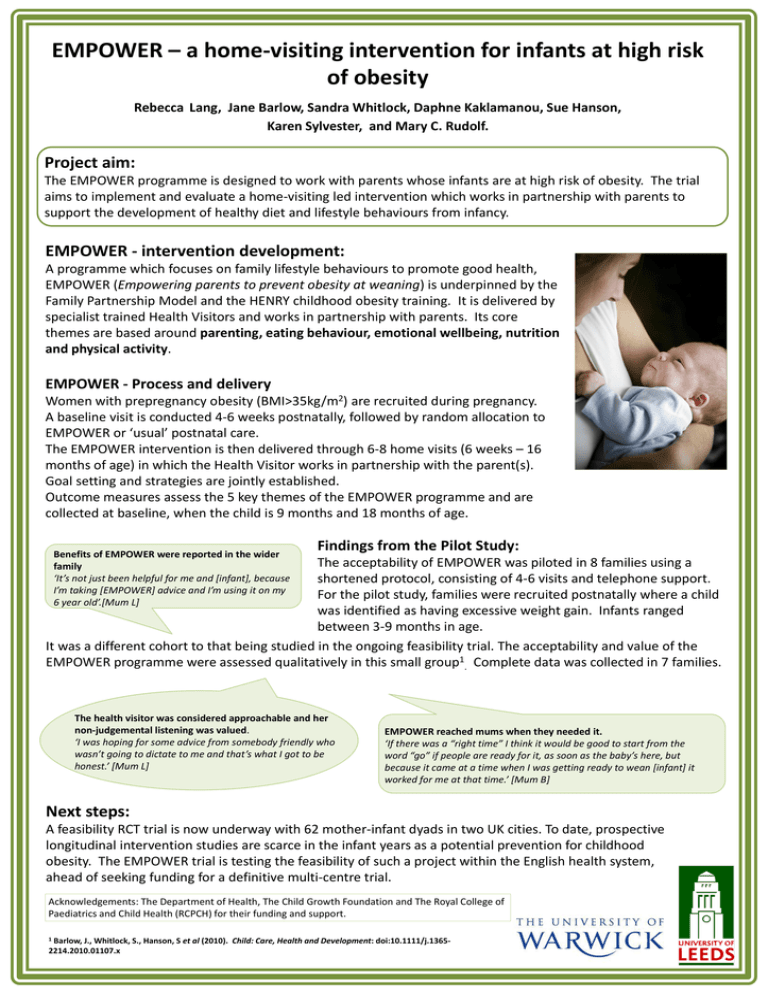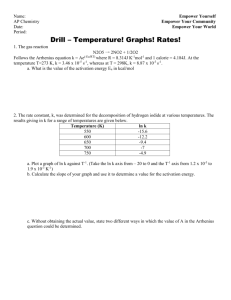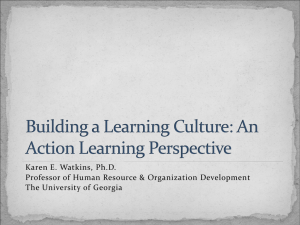EMPOWER – a home-visiting intervention for infants at high risk
advertisement

EMPOWER – a home-visiting intervention for infants at high risk of obesity Rebecca Lang, Jane Barlow, Sandra Whitlock, Daphne Kaklamanou, Sue Hanson, Karen Sylvester, and Mary C. Rudolf. Project aim: The EMPOWER programme is designed to work with parents whose infants are at high risk of obesity. The trial aims to implement and evaluate a home-visiting led intervention which works in partnership with parents to support the development of healthy diet and lifestyle behaviours from infancy. EMPOWER - intervention development: A programme which focuses on family lifestyle behaviours to promote good health, EMPOWER (Empowering parents to prevent obesity at weaning) is underpinned by the Family Partnership Model and the HENRY childhood obesity training. It is delivered by specialist trained Health Visitors and works in partnership with parents. Its core themes are based around parenting, eating behaviour, emotional wellbeing, nutrition and physical activity. EMPOWER - Process and delivery Women with prepregnancy obesity (BMI>35kg/m2) are recruited during pregnancy. A baseline visit is conducted 4-6 weeks postnatally, followed by random allocation to EMPOWER or ‘usual’ postnatal care. The EMPOWER intervention is then delivered through 6-8 home visits (6 weeks – 16 months of age) in which the Health Visitor works in partnership with the parent(s). Goal setting and strategies are jointly established. Outcome measures assess the 5 key themes of the EMPOWER programme and are collected at baseline, when the child is 9 months and 18 months of age. Benefits of EMPOWER were reported in the wider family ‘It’s not just been helpful for me and [infant], because I’m taking [EMPOWER] advice and I’m using it on my 6 year old’.[Mum L] Findings from the Pilot Study: The acceptability of EMPOWER was piloted in 8 families using a shortened protocol, consisting of 4-6 visits and telephone support. For the pilot study, families were recruited postnatally where a child was identified as having excessive weight gain. Infants ranged between 3-9 months in age. It was a different cohort to that being studied in the ongoing feasibility trial. The acceptability and value of the EMPOWER programme were assessed qualitatively in this small group1. Complete data was collected in 7 families. The health visitor was considered approachable and her non-judgemental listening was valued. ‘I was hoping for some advice from somebody friendly who wasn’t going to dictate to me and that’s what I got to be honest.’ [Mum L] EMPOWER reached mums when they needed it. ‘If there was a “right time” I think it would be good to start from the word “go” if people are ready for it, as soon as the baby’s here, but because it came at a time when I was getting ready to wean [infant] it worked for me at that time.’ [Mum B] Next steps: A feasibility RCT trial is now underway with 62 mother-infant dyads in two UK cities. To date, prospective longitudinal intervention studies are scarce in the infant years as a potential prevention for childhood obesity. The EMPOWER trial is testing the feasibility of such a project within the English health system, ahead of seeking funding for a definitive multi-centre trial. Acknowledgements: The Department of Health, The Child Growth Foundation and The Royal College of Paediatrics and Child Health (RCPCH) for their funding and support. 1 Barlow, J., Whitlock, S., Hanson, S et al (2010). Child: Care, Health and Development: doi:10.1111/j.13652214.2010.01107.x




